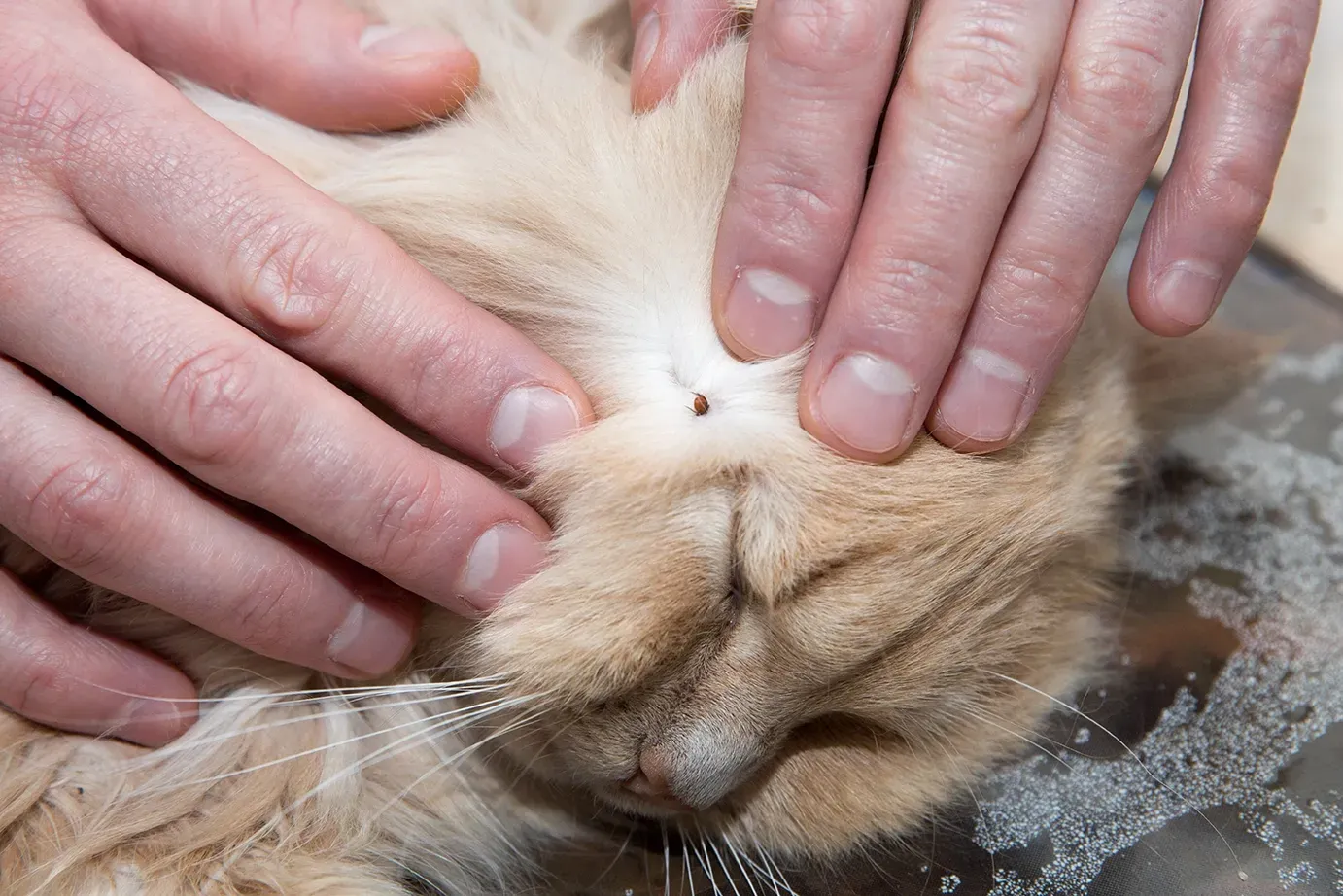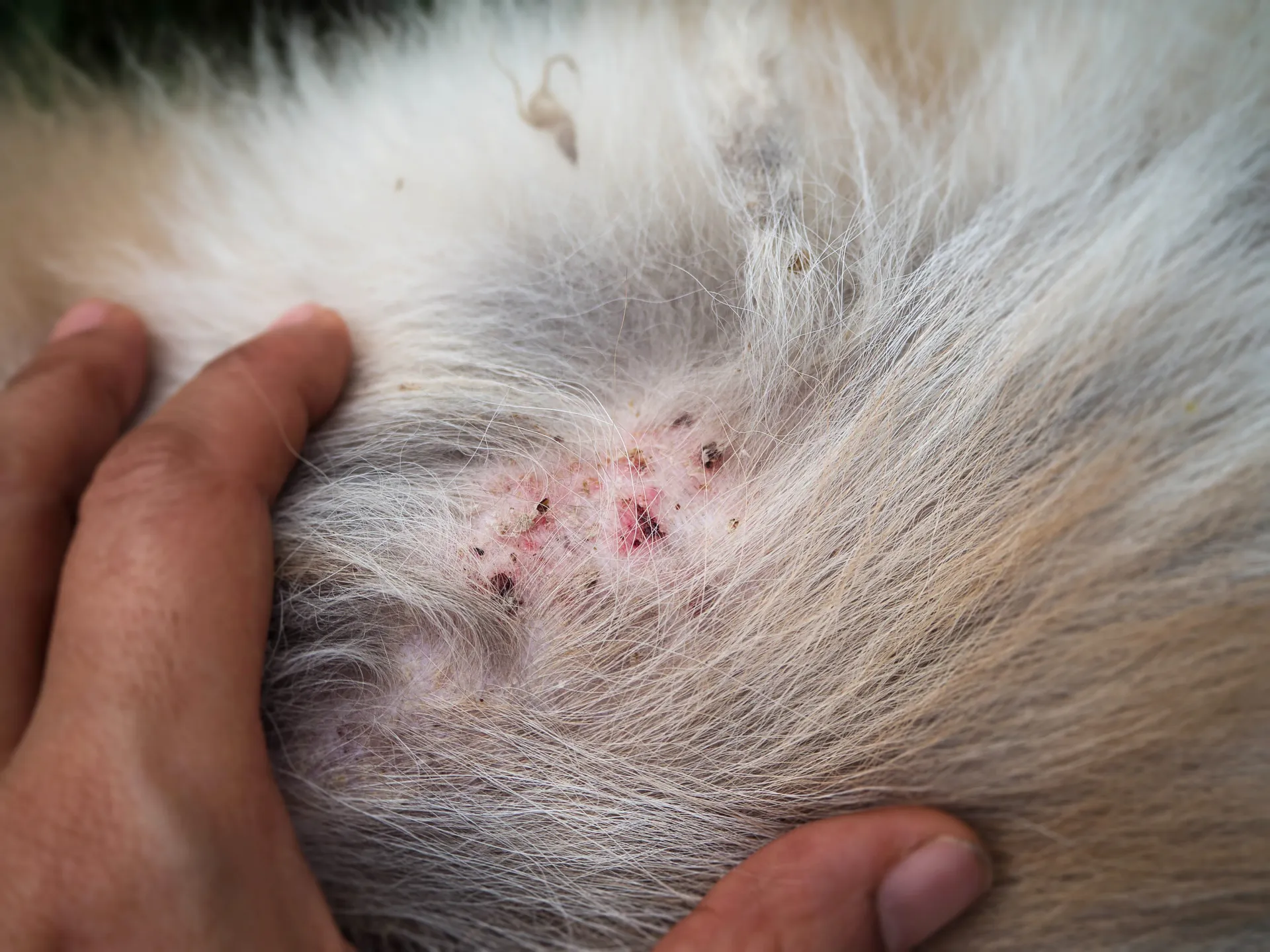Fleas
Fleas are tiny, parasitic insects that can quickly become a nuisance in homes, especially for pet owners. These pests feed on the blood of animals and humans, causing discomfort through bites and potential allergic reactions.
Fleas are not just a seasonal problem; they can thrive indoors year-round, hiding in carpets, upholstery, and pet bedding. Left untreated, a small flea issue can escalate into a full-blown infestation, making it important for homeowners to understand how to promptly prevent and address flea problems.

If you have any questions, here are a few of the frequently asked questions.
Fleas are resilient pests that can jump up to 150 times their body length, making it easy for them to move from one host to another, including your pets, furniture, and even you.
They can survive for weeks without feeding, and their eggs can lie dormant in carpets or cracks for months, making infestations particularly tricky to eliminate.
Comprehending the behavior of these pests is crucial for effective control. For homeowners grappling with flea problems, there are common questions about flea control—here are some frequently asked questions to guide you.
1. How do I know if my home has a flea infestation?
Flea infestations are often indicated by excessive scratching in pets, flea dirt (small black specks) on pet bedding or carpets, and visible fleas on your pet or around your home. You may also notice red, itchy bites on your skin, typically around the ankles.
2. Can fleas survive without a host?
Yes, adult fleas can survive for several days to weeks without a host, but they need blood to reproduce. Flea eggs and larvae can survive for months in your home, particularly in carpets, furniture, and cracks in floors.
3. How do I treat my pets for fleas?
There are various flea treatments for pets, including topical treatments, oral medications, flea collars, and shampoos. Consult your veterinarian to choose the most effective and safest option for your specific pet.
4. How can I prevent fleas from infesting my home?
Regularly treat your pets with flea preventatives, vacuum your home frequently, wash pet bedding in hot water, and maintain a clean environment. It's also helpful to keep your yard trimmed and free of debris where fleas can hide.
5. What are the most effective methods for killing fleas in my home?
Effective methods include vacuuming carpets and upholstery thoroughly, using flea sprays or foggers, washing all bedding and linens, and treating your pets simultaneously. Professional pest control services may be necessary for severe infestations.
6. Are flea treatments safe for my children and other pets?
Most flea treatments are safe when used as directed. However, it's important to follow the product instructions carefully. Keep children and other pets away from treated areas until the product has dried or settled.
7. How long does it take to get rid of a flea infestation?
Flea infestations can take anywhere from a few weeks to several months to fully eradicate, depending on the severity of the infestation and how consistently the treatments are applied.
8. Can fleas carry diseases?
Yes, fleas can transmit various diseases, such as the plague, flea-borne typhus, and cat scratch fever. They can also cause allergic reactions and severe itching in both humans and pets.
9. Can I get rid of fleas naturally?
While some natural remedies, like diatomaceous earth or essential oils, may help reduce flea populations, they are often not as effective as conventional treatments and may not fully eliminate an infestation. It's best to use them in conjunction with other methods.
10. Why do I still see fleas after treatment?
Flea eggs and larvae can continue to develop even after treatment, leading to new fleas hatching. It's important to continue treatment for several weeks and to treat the entire environment, including pets, home, and yard, to break the flea life cycle.
Understanding the types of fleas in your household

Professional flea exterminators are trained to accurately identify the specific types of fleas in your area, which is essential for effective treatment. Different species of fleas, such as cat fleas, dog fleas, or even bird and rodent fleas, have unique behaviors and habitat preferences.
Our GetLocal Services Exterminators use their expertise to determine flea species based on signs like bite patterns, host animals, and environmental factors. By identifying the exact type of flea, they can tailor their treatment methods to target the fleas’ specific life cycle and breeding grounds, ensuring a more prosperous and long-lasting solution for your flea problem.
1. Cat Flea (Ctenocephalides felis)
- Description: The most prevalent flea species found in homes, despite its name, it infests not just cats but also dogs and other mammals, including humans.
- Characteristics: They are small, dark brown, and have powerful legs for jumping. They are known for their rapid reproduction, making them difficult to control once they have infested a home.
2. Dog Flea (Ctenocephalides canis)
- Description: Similar in appearance to cat fleas but less common in homes. They primarily infest dogs but can also bite humans and other animals.
- Characteristics: Dog fleas are slightly rarer than cat fleas but behave similarly, causing itching and discomfort to their hosts.
3. Human Flea (Pulex irritans)
- Description: Less common in modern homes, this flea species prefers human hosts but can also be found on pigs and other animals.
- Characteristics: They have a broader host range and are typically larger than cat and dog fleas. They are now rare in most developed countries due to improved hygiene and pest control.
4. Oriental Rat Flea (Xenopsylla cheopis)
- Description: Commonly associated with rats, these fleas can infest homes, especially in urban areas with high rodent populations.
- Characteristics: They are known for their role in spreading diseases like plague and murine typhus. They primarily infest rodents but can also bite humans.
5. Sticktight Flea (Echidnophaga gallinacea)
- Description: This species mainly infests poultry but can also attach to dogs, cats, and humans.
- Characteristics: Unlike other fleas, sticktight fleas attach firmly to the host's skin around the eyes, ears, and face, causing localized irritation and potential infection.
6. Rabbit Flea (Spilopsyllus cuniculi)
- Description: As the name suggests, these fleas are commonly found on rabbits but can occasionally infest homes where pets like rabbits and dogs are present.
- Characteristics: They are less common in homes but can cause irritation and discomfort to pet rabbits and other animals they infest.
7. Bird Fleas (Ceratophyllus spp.)
- Description: These fleas infest birds and their nests but can occasionally bite humans and pets when their avian hosts are not available.
- Characteristics: Usually found in homes with bird nests nearby. They typically leave when the birds vacate the nest but can become a temporary nuisance to humans and pets.
8. Moorhen Flea (Dasypsyllus gallinulae)
- Description: A type of bird flea that can be found in homes with a high population of certain wild birds.
- Characteristics: They are rare in homes but can be a problem in rural or suburban areas close to water bodies where their avian hosts live.
Flea extermination control services for a hassle-free experience.
At GetLocal Services, our platform's transparent pest control pricing eliminates the need for price shopping. Our system provides you with the best price based on the experience and qualifications of our thoroughly vetted exterminators.
Our professional network members undergo a rigorous vetting process to ensure they meet our high standards. This guarantees that you receive top-quality service at a fair price, making your experience with us completely hassle-free.
Avoiding Annoying Sales Calls
One significant advantage of using GetLocal Services is avoiding the annoyance of multiple sales calls from vendors vying for your business.
Once you select an exterminator through our platform, you won’t be bombarded with follow-up calls from other vendors. This ensures a stress-free experience, allowing you to easily focus on resolving your flea problem.
Our professionals are available in your area if you need a flea exterminator.
If you’re facing a flea infestation, our local exterminators are here to help. We specialize in treating the specific types of fleas in your area, using effective methods to eliminate the problem and prevent future issues. Contact us today to schedule an inspection and keep your home pest-free.
DELAWARE
FLORIDA
GEORGIA
NEW JERSEY
PENNSYLVANIA
NORTH CAROLINA

Money-Back Guarantee!
Unhappy with the service? We'll send another provider. Still unsatisfied? Our money-back guarantee will make it right.
GetLocal Hassle-Free Home Services
ARE YOU A HOME SERVICES PROFESSIONAL?
Partner with us to connect with homeowners who seek trusted professionals, boosting your visibility and reputation in your community.

SERVICES
TOP LOCAL SERVICE AREAS
- New Jersey
- North Carolina
- Florida
- Georgia
- Pennsylvania
- Delaware
- USA
JOIN OUR MAILING LIST
Sign up for home services tips and more
Join the Newsletter
We will get back to you as soon as possible
Please try again later
Copyright, GetLocal Services, LLC. | All Rights Reserved. | Terms of Use | Privacy Policy








